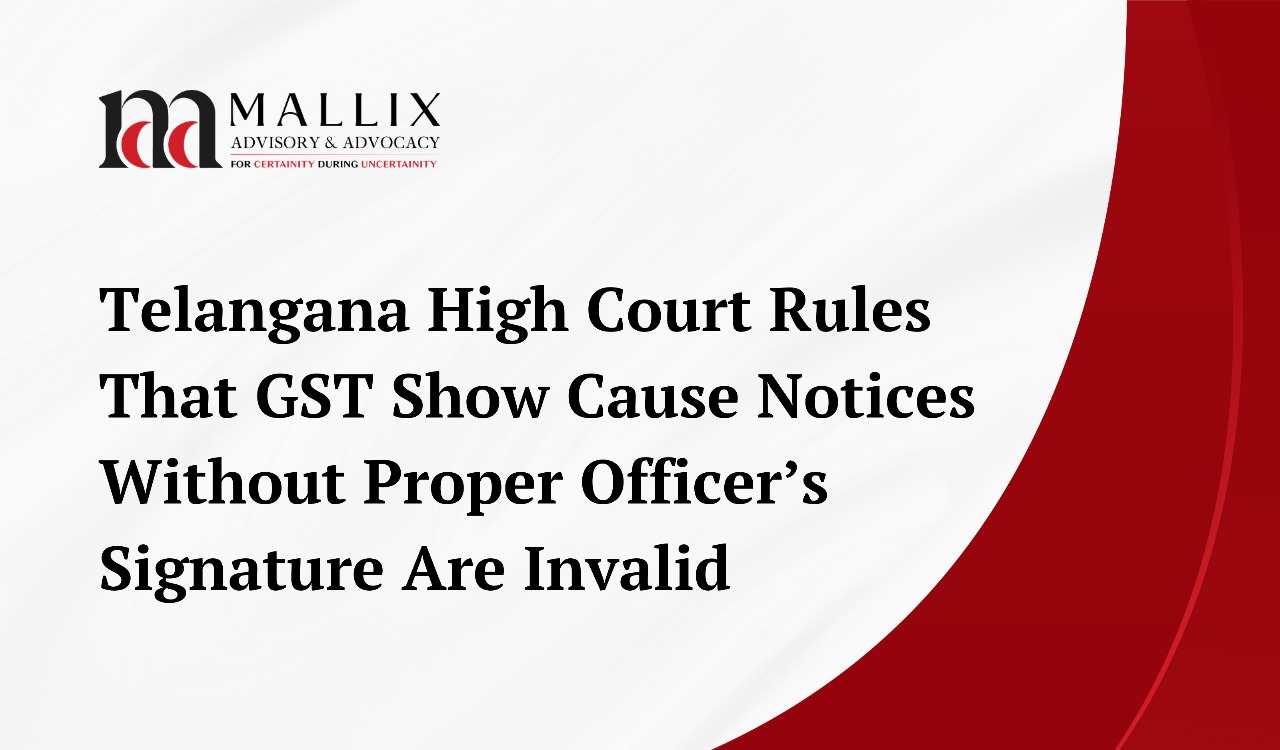Introduction
In a significant ruling, the Telangana High Court has held that a Goods and Services Tax (GST) Show Cause Notice (SCN) or order issued without the proper officer’s signature is legally unsustainable and cannot withstand judicial scrutiny. This decision reaffirms the necessity of procedural compliance in tax administration and underscores taxpayers’ rights against arbitrary actions by tax authorities.
Background of the Case
The case before the Telangana High Court involved a challenge to a GST order that was issued without bearing the signature of the proper officer. The petitioner contended that such an unsigned order was not legally valid and violated principles of natural justice. The absence of authentication by the concerned officer rendered the order unenforceable.
The respondent, representing the GST department, argued that the order was issued electronically and that the absence of a physical signature did not invalidate the proceedings. However, the court found this reasoning unconvincing and emphasized that procedural requirements must be strictly followed.
Key Observations by the Court
The Telangana High Court ruled in favor of the petitioner, highlighting the following key points:
- Requirement of Proper Authentication – The court reaffirmed that a GST show cause notice or order must bear the signature of the proper officer to be legally valid. Without proper authentication, such documents lack legal sanctity.
- Procedural Compliance Is Mandatory – The judgment emphasized that GST authorities must strictly adhere to procedural requirements under the GST Act. Any deviation from statutory provisions, such as issuing an unsigned order, can render the order void.
- Principles of Natural Justice – The court noted that an unsigned order fails to provide a transparent and accountable decision-making process. Taxpayers have the right to challenge and respond to notices that are duly authenticated, ensuring fairness in proceedings.
- Judicial Scrutiny of Flawed Orders – The High Court clarified that any GST order or SCN issued in violation of statutory requirements cannot stand judicial scrutiny and must be quashed.
Implications of the Judgment
For Taxpayers
- This ruling strengthens taxpayers’ rights by reinforcing that they should receive duly signed and authenticated GST notices and orders.
- Any SCN or order received without the proper officer’s signature can be challenged as legally invalid.
- Businesses can use this precedent to contest arbitrary demands arising from unsigned or improperly issued tax orders.
For GST Authorities
- The judgment serves as a reminder for tax authorities to follow procedural mandates strictly.
- Ensuring that all GST orders and notices are duly signed will prevent unnecessary litigation and procedural lapses.
- Electronic issuance of orders must still comply with legal requirements, including proper authentication.
Conclusion
The Telangana High Court’s ruling reinforces the importance of procedural compliance in tax administration under the GST regime. It establishes a crucial precedent that unsigned GST notices and orders are not valid, safeguarding taxpayers from arbitrary and flawed assessments. This judgment underscores the principle that government authorities must adhere to statutory mandates while exercising their powers, thereby ensuring fairness and transparency in tax proceedings.
This decision is a positive development for businesses and taxpayers, as it affirms their right to challenge procedural lapses in tax administration and prevents arbitrary enforcement actions.


